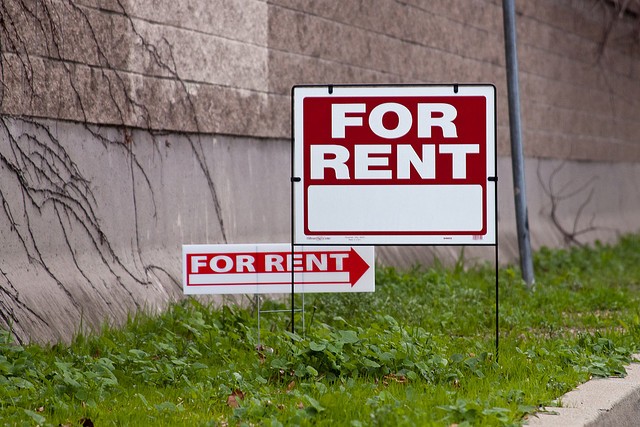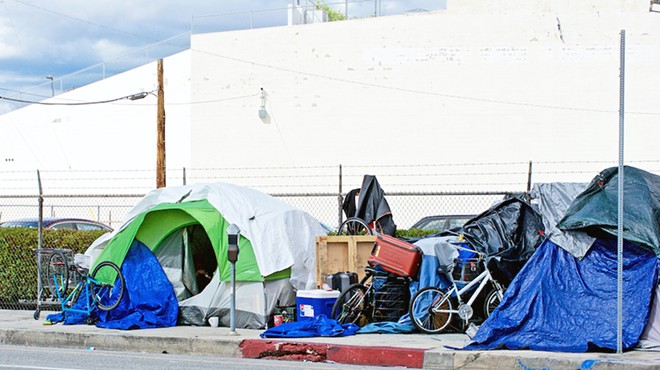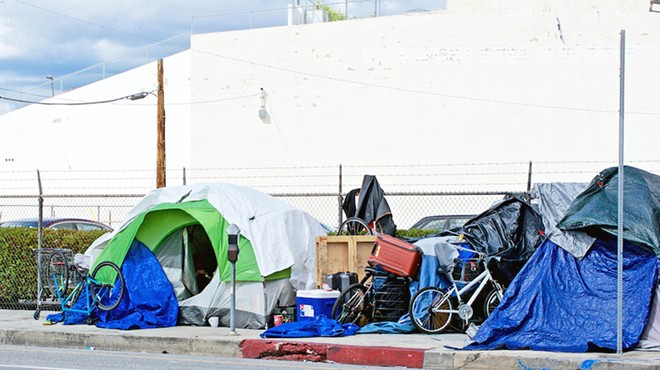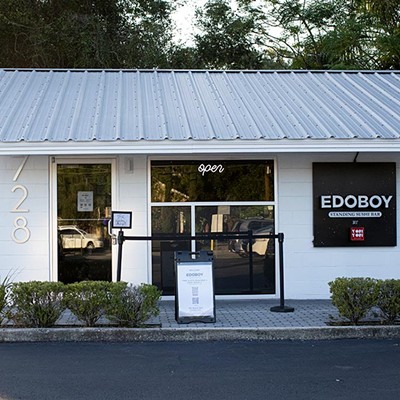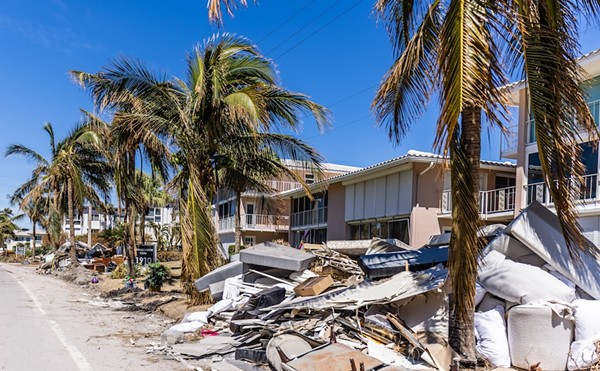Working adults need to earn at least $31.50 an hour to comfortably afford a one-bedroom apartment in the Orlando metro area, or $35.71 an hour to afford a two-bedroom rental, according to a new report from the National Low Income Housing Coalition.
Earning less, based on the nonprofit's calculation, means you’ll probably be putting more than 30 percent of your monthly income toward rent, a threshold that housing experts describe as “cost-burdened.”
Dan Emmanuel, senior research analyst for the National Low Income Housing Coalition, said the U.S. is facing “historic challenges” with homelessness. According to the U.S. Department of Housing and Urban Development, more than 650,000 people experienced homelessness on any given night last year, the highest level on record.
“Unfortunately,” said Emmanuel on a press call Thursday, “some states and localities respond to this by trying to criminalize homelessness instead of addressing its root cause, which is really a lack of affordable housing options.”
The National Low Income Housing Coalition released its annual “Out of Reach” report last week, detailing just how much you need to earn in order to afford rental housing in communities across the country. Florida was ranked the most expensive state to live in the U.S. South.
According to the new report, renters nationally need to earn $32.11 per hour for a modest two-bedroom rental home, on average, and $26.74 for a modest one-bedroom rental home. Florida has the 10th highest “housing wage” nationwide.
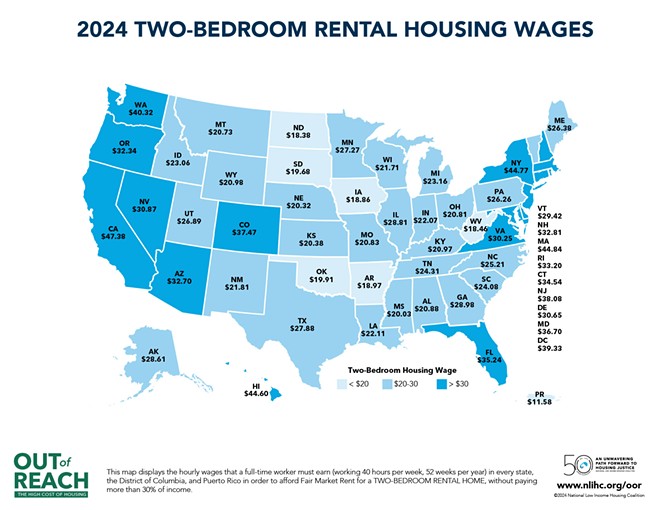
As longtime residents are painfully aware, Florida was a hot spot for major rent spikes a couple of years ago, in the second and third years of the COVID-19 pandemic, and although rent increases have slowed or stabilized in many areas, a wide swath of renters (not the ones moving into all those luxury high-rises being built) are still struggling just to keep up.
According to the new report, a person who earns Florida’s minimum wage of $12 an hour would need to work a near-impossible 117 hours a week to afford a two-bedroom rental home in the Sunshine State, based on fair market rent values.
Fair market rent for a two-bedroom in Florida is $1,833 on average, according to the report, or a slightly higher $1,857 in the Orlando metro area, a region that also includes Sanford and Kissimmee.
Problem is, the average hourly wage of renters in this Central Florida region is only $22.10 an hour, or roughly $46,000 per year before taxes, assuming you work 40 hours a week. Much of Central Florida's economy is tourism-based, dependent on jobs in the hospitality and service sectors that are often low-pay, precarious and non-union.
Obviously there’s a gap here — one that affects low-income earners the most, but one that is increasingly affecting middle-income earners in more expensive areas, too.
Nationally, median rent increased by a full 25 percent between 2021 and 2022, according to Diane Yentel, President and CEO of the NLIHC.
Orange County, for its part, saw its largest jump in rent prices in 2022, according to data analyzed by The Guardian — the same year that a majority of Orange County residents voted to cap rent increases at no more than 10%, before the real estate lobby sued to block the stop-gap solution from going into effect.
The US Government Accountability Office has found that a $100 increase in median monthly rent is associated with a 9 percent increase in homelessness in that community, a statistic regularly cited these days by local advocates like Martha Are, CEO of the Homeless Services Network of Central Florida.
“Our options [for housing] are declining,” said Are during a press conference earlier this month, “while our numbers are going up.”
A recent count of homeless people in the Central Florida region, conducted earlier this year, found the number across Orange, Osceola and Seminole counties this January rose 28 percent in total — from 2,258 people in 2023 to 2,883 in 2024.
Meanwhile, the total number of those people without any sort of shelter across the region increased 105 percent — from 587 people to just about 1,200. This population, described as the “unsheltered homeless,” includes people who are sleeping on the street, on sidewalks, in abandoned buildings or in other places not intended for human habitation.
Are and other local housing advocates say the key issue is a shortage of affordable housing, as well as a community of people grappling with the past few couple of years of rent hikes. The recent homelessness count found an alarming increase in the number of older and elderly adults who are living unsheltered, while local school systems have also reported an increase in homeless students.
U.S. Congressman Jimmy Gomez, D-CA, who joined Yentel on a press call to announce the release of the new housing report, said based on conversations he’s had with members of Congress from states across the country, including Florida, the problem is everywhere.
“This is no longer a blue state, blue city issue,” said Gomez, who — along with Orlando Congressman Maxwell Frost — helped spearhead the formation of the first ever Congressional Renters Caucus last year. “This is an American crisis that we need to attack head-on.”
Housing experts with the National Low Income Housing Coalition highlighted in their report several federal policy proposals, including reforms to housing voucher programs that serve low-income families and veterans, significant investment in affordable housing development, policies to protect renters from price-gouging, and guaranteed legal counsel for low-income renters facing eviction, who are significantly less likely to have a lawyer than their landlords.
Locally, housing advocates recently kicked off a new initiative to end homelessness among youth and young adults, and have also called on local elected leaders (who have, granted, dedicated tens of millions of dollars towards housing issues) to put their money where their mouth is and increase their investment.
The number of permanent supportive housing and shelter beds in the Central Florida region has declined over the past year, according to Are of the Homeless Services Network. This leaves a greater number of homeless people in a particularly precarious situation with a new state law, effective this fall, that puts them at further risk of being criminalized for lacking a place to sleep at night.
Florida lawmakers and Gov. Ron DeSantis this year approved a controversial state policy (HB 1365) that will ban people from sleeping on public property. The law also allows private citizens or businesses to sue local governments that fail to enforce the ban.
The law, effective Oct. 1, permits municipal governments to create designated, state-sanctioned areas where public camping is allowed, provided such encampments have things like clean restrooms, 24-hour security and treatment for substance abuse.
The bill doesn’t have funding attached, meaning local governments will have to dip into their own piggy-banks to set up such encampment properties, when or if they choose to do so.
A major Supreme Court ruling released last Friday in Grants Pass v. Johnson, involving a local ordinance in Grants Pass, Oregon, further bolsters the new Florida law. The 6-3 ruling affirms that homelessness is not a status protected by the Eighth Amendment’s prohibition on cruel and unusual punishment, even when local communities don’t have enough shelter beds for those who are living on the streets, in the woods, or in any other place not fit for habitation.
Follow us: Apple News | Google News | NewsBreak | Reddit | Instagram | Facebook | Twitter | or sign up for our RSS Feed

